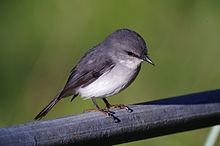白胸鴝鶲
白胸鴝鶲(學名:Quoyornis georgianus)是一種屬於鴝鶲科的鳥綱動物。白胸鴝鶲是西澳大利亞州西南部份獨有的品種。與許多其他澳大利亞鴝鶲不同,牠們身上沒有顏色鮮艷的羽毛,僅有一些灰色羽毛,以及位於腹部的白色羽毛。白胸鴝鶲與澳大利亞其他雀形動物的相似之處,就是當一對或一群白胸鴝鶲找到定居點後,他們便會保衛自己的家園。
| 白胸鴝鶲 | |
|---|---|

| |
| 白胸鴝鶲,攝於西澳大利亞。 | |
| 科學分類 | |
| 界: | 動物界 Animalia |
| 門: | 脊索動物門 Chordata |
| 綱: | 鳥綱 Aves |
| 目: | 雀形目 Passeriformes |
| 科: | 鴝鶲科 Petroicidae |
| 屬: | 白胸鴝鶲屬 Quoyornis Mathews, 1912 |
| 種: | 白胸鴝鶲 Q. georgianus
|
| 二名法 | |
| Quoyornis georgianus | |
| 異名[2] | |
|
Muscicapa georgiana Quoy & Gaimard, 1830 | |
分類
編輯法國博物學家吉恩勒內·康斯坦槐奧和約瑟夫·保羅·蓋馬爾於1830年首次為白胸鴝鶲起了學名「Muscicapa georgiana」。[3]於1846年,約翰·古爾德將白胸鴝鶲重新命名為「Eopsaltria leucogaster」。[4]而現今的學名是以1846年的Eopsaltria以及1830年的georgiana組合而成。
白胸鴝鶲與歐亞鴝或美國知更鳥的關係不大。白胸鴝鶲屬於鴝鶲屬,並在澳洲被分類為「黃知更」,以與同為鴝鶲屬的「紅知更」分開。白胸鴝鶲亦被稱為白腹鴝鶲或白胸伯勞知更鳥。[5]
在一個於2009年進行的核與粒線體DNA的遺傳分析研究中,科學家意外地發現白胸鴝鶲與澳洲大陸東北部的鴝鶲是姐妹群。[6]
描述
編輯白胸鴝鶲身長約14.5厘米。雄性和雌性的羽毛顏色相近,上半身的顏色為藍灰色,眉毛的顏色稍淡,而腹部的顏色則為白色。白胸鴝鶲灰色的尾巴末端顏色為白色,其喙及腳均為黑色,而其眼睛則為茶色。在澳洲北方的白胸鴝鶲體形較小,顏色亦更深色。而雛鳥的羽毛則為棕色。[7]
分佈及棲息地
編輯白胸鴝鶲居住於西澳大利亞州由傑洛頓南方到露紋角之間的一大片區域。在這片區域的南部,白胸鴝鶲通常會居住於位於河流附近的森林。而在這片區域的北部,白胸鴝鶲則多出現於沿海地區。[7]當一對或一群白胸鴝鶲找到定居點後,他們便會保衛自己的家園。
習性
編輯白胸鴝鶲是合作繁殖動物。當一對白胸鴝鶲在繁殖時,在牠們旁邊會有一個或以上的鴝鶲幫助牠們照顧雛鳥,[8]而幫助照顧雛鳥的鴝鶲皆為雄性。雌鳥會在繁殖一年後離開雄性,而雄性則會繼續居住於其定居點。[8]
繁殖
編輯由冬季後期至夏季早期是白胸鴝鶲的繁殖期。白胸鴝鶲的巢是由乾草和樹枝組成的。在一對白胸鴝鶲的巢中,最多會有兩隻雛鳥居住。[9]白胸鴝鶲的蛋顏色為橄欖綠或藍綠色,而蛋的大小約為16毫米x21毫米大。[10]這些蛋的孵化為期16至17天,而雛鳥會在孵化兩個星期後離開鳥巢。[8]
參考文獻
編輯- ^ BirdLife International. Eopsaltria georgiana. The IUCN Red List of Threatened Species. 2012 [26 November 2013].
- ^ Australian Biological Resources Study. Species Eopsaltria (Quoyornis) georgiana (Quoy & Gaimard, 1830). Australian Faunal Directory. Department of the Environment, Water, Heritage and the Arts, Australian Government. 12 June 2010 [19 June 2019].
- ^ Quoy, J.R.C. & Gaimard, J.P. in Dumont-d'Urville, J. (1830). Voyage de découvertes de l'Astrolabe exécuté par ordre du Roi, pendant les anneés 1826-1827-1828-1829, sous le commandement de M.J. Dumont-d'Urville. Zoologie. Paris: J. Tastu Vol. 1
- ^ Gould J. Descriptions of eleven new species of Australian birds. Proc. Zool. Soc. Lond. 1846: 18–21.
- ^ Boles, Walter E. The Robins and Flycatchers of Australia. Sydney: Angus & Robertson. 1988: 119. ISBN 0-207-15400-7.
- ^ Loynes, Kate; Joseph, Leo; Keogh, J. Scott. Multi-locus phylogeny clarifies the systematics of the Australo-Papuan robins (Family Petroicidae, Passeriformes). Molecular Phylogenetics and Evolution. 2009, 53 (1): 212–19. doi:10.1016/j.ympev.2009.05.012.
- ^ 7.0 7.1 Simpson K, Day N, Trusler P. Field Guide to the Birds of Australia. Ringwood, Victoria: Viking O'Neil. 1993: 392. ISBN 0-670-90478-3.
- ^ 8.0 8.1 8.2 Russell EM, Brown RJ, Brown MN. Life history of the white-breasted robin, Eopsaltria georgiana (Petroicidae), in south-western Australia. Australian journal of zoology. 2004, 52 (2): 111–45. doi:10.1071/ZO03049.
- ^ Cooney SJN, Watson DM, Young J. Mistletoe nesting in Australian birds: a review (PDF). Emu (CSIRO Publishing). 2006, 106: 1–12 [2007-06-07]. doi:10.1071/MU04018. (原始內容存檔 (PDF)於2009-10-14).
- ^ Beruldsen, G. Australian Birds: Their Nests and Eggs. Kenmore Hills, Qld: self. 2003: 336–37. ISBN 0-646-42798-9.
